Understanding the Importance of a Registered Nurse Cover Letter
In the competitive field of nursing, a well-crafted cover letter is your first opportunity to make a lasting impression. It’s more than just a formality; it’s a crucial tool that can significantly influence whether you land an interview. A cover letter serves as a personal introduction, providing hiring managers with a snapshot of your qualifications, experience, and personality. It goes beyond the information presented in your resume, allowing you to articulate your career goals, express your enthusiasm for the specific role and organization, and demonstrate why you are the ideal candidate. Neglecting this step can mean missing out on valuable opportunities, so understanding the power of a strong cover letter is paramount to any registered nurse seeking employment.
Why a Cover Letter Matters
A cover letter matters because it allows you to personalize your application. Unlike a resume, which provides a factual overview of your skills and experience, a cover letter gives you the space to connect with the hiring manager on a more personal level. It allows you to demonstrate your understanding of the role and the organization’s values, showing that you’ve done your research and are genuinely interested. Moreover, a cover letter gives you the opportunity to address any potential gaps in your resume or explain any career transitions. By highlighting your accomplishments and showcasing your unique qualities, you can distinguish yourself from other applicants and increase your chances of securing an interview. This is particularly important in a field like nursing, where empathy, communication skills, and a genuine passion for patient care are highly valued.
Key Components of a Strong Cover Letter
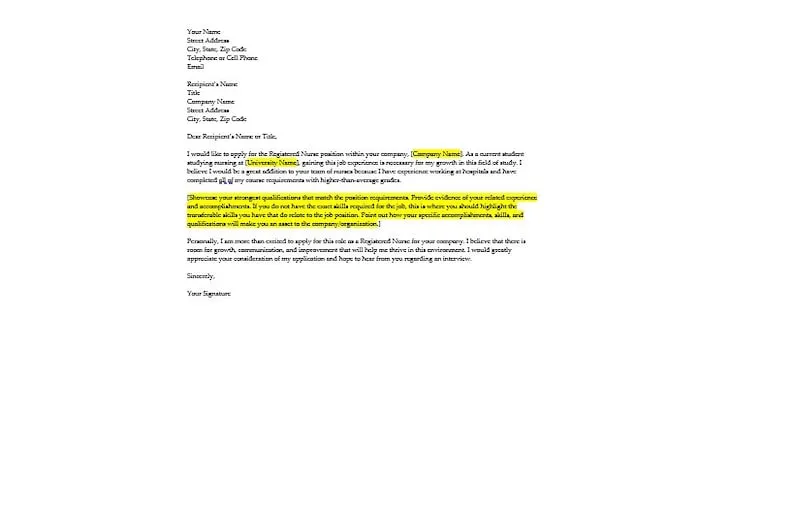
A strong cover letter consists of several essential components. It should begin with a professional header containing your contact information and the date. Next, address the hiring manager by name, if possible; this shows you’ve taken the time to personalize your application. The opening paragraph should immediately grab the reader’s attention, expressing your interest in the position and briefly highlighting your key qualifications. The body of the letter should elaborate on your skills, experience, and achievements, providing specific examples to support your claims. You should also explain why you are interested in the specific role and organization, demonstrating your understanding of their mission and values. Finally, a strong closing should reiterate your interest, express your gratitude for the opportunity, and include a clear call to action, such as inviting the hiring manager to contact you for an interview. Remember to proofread your letter carefully for any grammatical errors or typos before submitting it.
Formatting Your Registered Nurse Cover Letter
The format of your cover letter is just as important as its content. A well-formatted letter is easy to read and demonstrates professionalism. Choose a standard font, such as Times New Roman or Arial, in a size between 10 and 12 points. Use single spacing within paragraphs and double spacing between paragraphs. Maintain consistent margins (typically one inch) throughout the document. Keep the tone professional, yet personable. Avoid using jargon or overly complex language. Aim for a clean and organized layout with clear sections and headings to guide the reader. Your goal is to present a polished and professional image that reflects your attention to detail and commitment to excellence.
Header and Contact Information
Your header should appear at the top of the cover letter and include your full name, address, phone number, and email address. Ensure your email address is professional; avoid using nicknames or unprofessional phrases. You can align this information to the left or right, but be consistent throughout the document. Following your contact information, include the date and the hiring manager’s name, title, and the company’s address. If you can’t find the hiring manager’s name, address the letter to the ‘Hiring Manager’ or ‘Recruiting Team.’ This section establishes your identity and provides the necessary contact information for the employer to reach you.
The Salutation
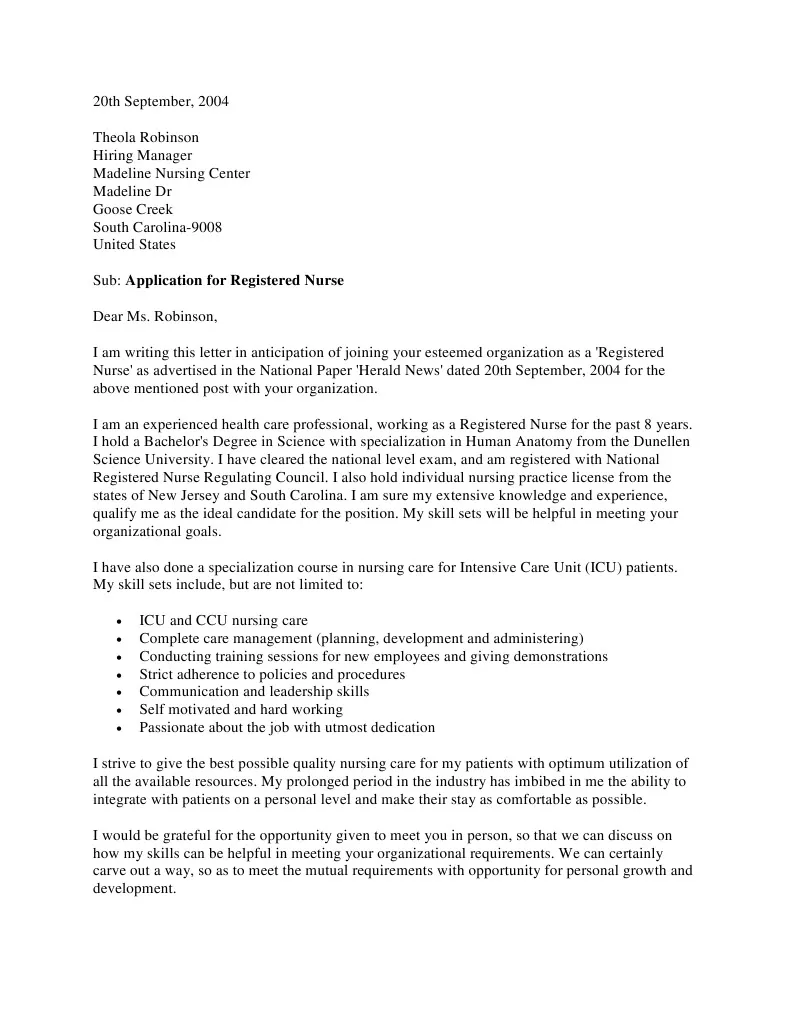
The salutation sets the tone for your cover letter. Whenever possible, address the hiring manager by name. This shows that you’ve taken the time to research the company and personalize your application. Use formal titles such as ‘Mr.’, ‘Ms.’, or ‘Dr.’ followed by their last name. If you are unsure of the hiring manager’s gender, use their full name. If you are unable to find a specific name, use a general salutation like ‘Dear Hiring Manager’ or ‘Dear Recruiting Team.’ Avoid generic salutations such as ‘To Whom It May Concern’ as they may seem impersonal. The salutation is the first point of contact, so make it professional and attentive.
Crafting a Compelling Opening Paragraph
The opening paragraph is your first chance to capture the hiring manager’s attention. Start by clearly stating the position you are applying for and how you learned about the opportunity. Briefly mention your most relevant qualifications or achievements to pique the reader’s interest. Show enthusiasm for the role and the organization. For example, you might write, ‘I am writing to express my enthusiastic interest in the Registered Nurse position at [Hospital Name], as advertised on [Platform]. With over [Number] years of experience in critical care and a passion for patient-centered care, I am confident I possess the skills and dedication to excel in this role.’ The goal is to make a strong first impression that encourages the reader to continue reading your letter.
Highlighting Your Skills and Experience
The body of your cover letter is where you highlight your skills and experience. Refer to the job description and identify the key requirements. Provide specific examples of how you have demonstrated these skills in previous roles. Use the STAR method (Situation, Task, Action, Result) to describe your accomplishments. For instance, describe a situation you faced, the task you were assigned, the actions you took, and the positive results you achieved. Quantify your achievements whenever possible by using numbers, percentages, or other metrics. This demonstrates the impact you made in previous roles. Tailor your examples to match the specific requirements of the job. This shows the hiring manager that you have the right skills and experience to succeed.
Showcasing Relevant Certifications
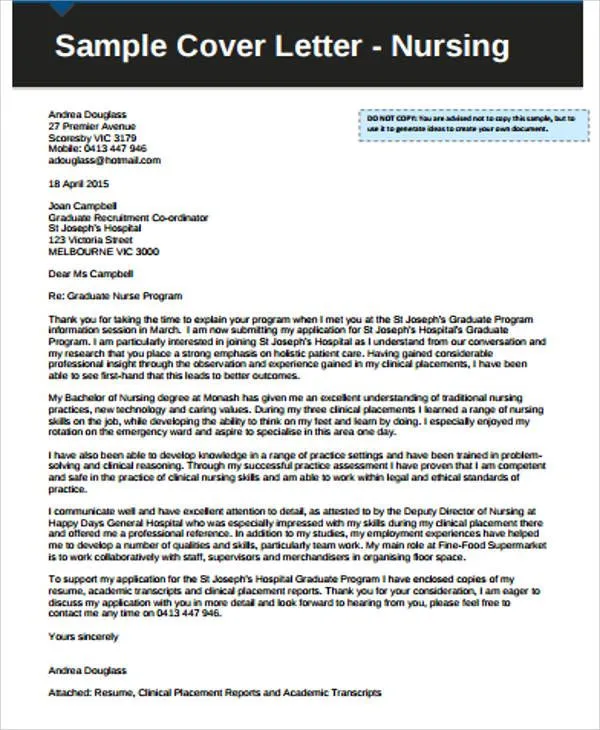
In the nursing profession, certifications play a crucial role in demonstrating your expertise and commitment to lifelong learning. In your cover letter, be sure to highlight any relevant certifications you hold, such as BLS, ACLS, PALS, or specialized certifications related to your area of expertise (e.g., critical care, oncology, or emergency nursing). Mention the certification name, the issuing organization, and the date of certification. If the job description specifically mentions required certifications, ensure you prominently feature them in your cover letter. This demonstrates your commitment to professional development and assures the employer that you meet the necessary qualifications for the role. Include also your license number.
Quantifying Achievements and Impact
Whenever possible, quantify your achievements to demonstrate your impact. Instead of simply stating you ‘improved patient outcomes,’ provide specific data, such as ‘Reduced patient fall rates by 15% through implementing a new fall prevention protocol.’ Or, ‘Managed a team of 10 nurses, resulting in a 20% increase in patient satisfaction scores.’ Using quantifiable data makes your accomplishments more concrete and compelling. It allows the hiring manager to understand the value you can bring to their organization. Consider using metrics such as the number of patients you’ve cared for, improvements in patient satisfaction, or reductions in medication errors. This helps the reader see tangible results and understand the direct benefits of your work.
Demonstrating Passion for Nursing
Nursing is a profession that demands compassion, empathy, and a genuine desire to help others. In your cover letter, demonstrate your passion for nursing by sharing your motivation for pursuing this career path. Explain what inspires you to provide patient care. Mention specific experiences or moments that have reinforced your commitment to the profession. Discuss your values, such as patient advocacy, teamwork, and continuous learning. Show the hiring manager that you are not just seeking a job but are dedicated to providing the best possible care. Sharing your passion will help you connect with the hiring manager on a deeper level and showcase your suitability for the role.
Expressing Your Professional Goals
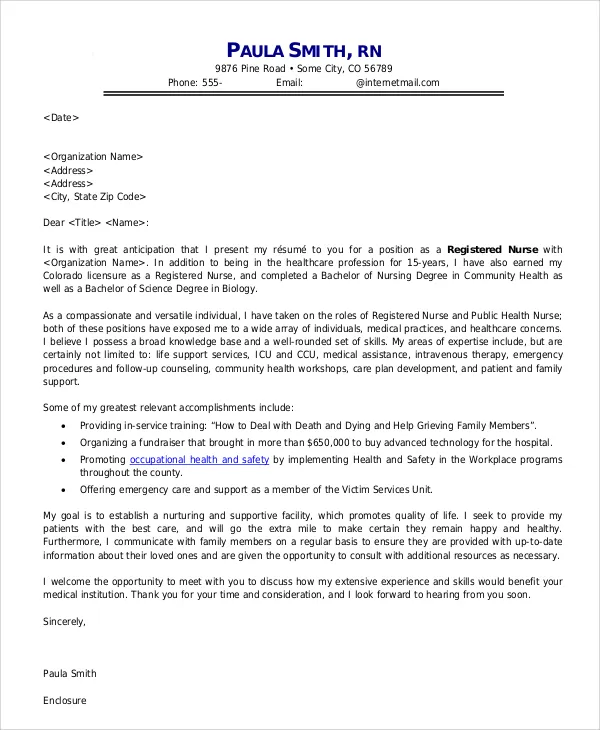
In your cover letter, briefly outline your career goals. Discuss your aspirations and how this role aligns with your professional development. Show the hiring manager that you are committed to growth and continuous improvement. Mention any specific areas of nursing you wish to specialize in or any professional certifications you plan to pursue. However, do not make it the focus of the letter. Tailor your goals to align with the organization’s mission and values. For instance, if the hospital emphasizes patient-centered care, highlight your dedication to providing compassionate and individualized care. This shows that you are not only looking for a job but also seeking a long-term career and investment in their organization.
Tailoring the Letter to the Job Description
The key to a successful cover letter is customization. Always tailor your cover letter to the specific job description. Carefully review the job requirements and identify the key skills and qualifications the employer is seeking. Use the same keywords and phrases from the job description throughout your letter. Highlight your relevant experience and provide examples that demonstrate how you meet those requirements. Show the hiring manager that you understand the specific needs of the role and the organization. Avoid using a generic cover letter; take the time to customize each application. Demonstrate to the employer you have put in the work and researched what they need, this increases your chances of getting an interview. This will significantly increase your chances of getting an interview and showcase your genuine interest in the position.
Writing a Strong Closing
The closing paragraph is your final opportunity to make a positive impression. Reiterate your interest in the position and express your enthusiasm for the opportunity. Thank the hiring manager for their time and consideration. Restate your key qualifications or achievements to leave a lasting impact. If you are particularly interested in the role, you might explicitly say so. The closing paragraph should include a call to action, such as inviting the hiring manager to contact you for an interview. Keep the closing concise and professional. End with a professional closing, such as ‘Sincerely’ or ‘Respectfully,’ followed by your full name and contact information.
The Call to Action
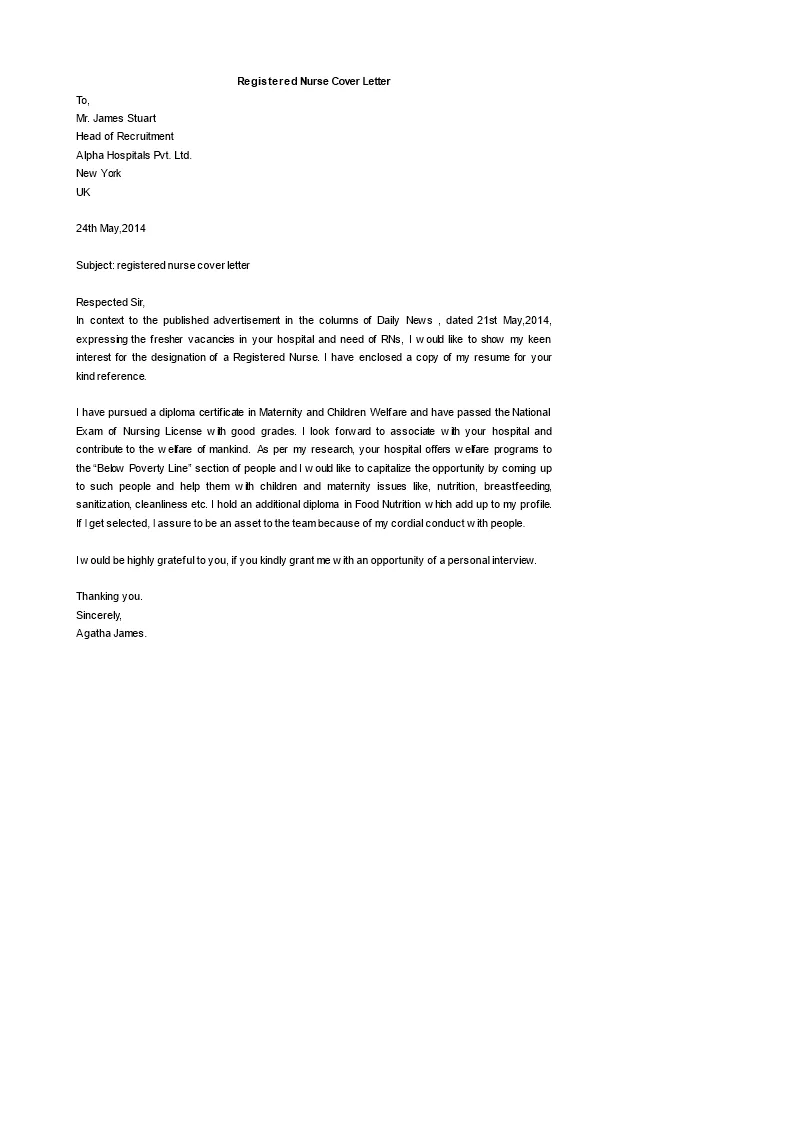
A clear call to action is crucial for encouraging the hiring manager to take the next step. In your closing paragraph, explicitly invite the hiring manager to contact you to schedule an interview or discuss your qualifications further. Provide your phone number and email address again for easy access. Make sure it is easy for the reader to contact you. Ensure that your availability for an interview is flexible and that you are ready to provide any additional information they may require. For example, you might write, ‘I am eager to discuss my qualifications in more detail and would welcome the opportunity to interview at your earliest convenience. You can reach me at [Phone Number] or [Email Address]. Thank you for your time and consideration.’ A strong call to action will make it easier for the hiring manager to take the next step.
Proofreading and Editing
Before submitting your cover letter, proofread it carefully for any errors. Spelling and grammatical mistakes can undermine your credibility and make you appear unprofessional. Check for typos, incorrect punctuation, and awkward phrasing. Read your cover letter aloud to catch any errors that you might miss when reading silently. Consider asking a friend, family member, or career counselor to review your cover letter for feedback. Ensure that the formatting is consistent and that the information is presented clearly and concisely. A well-proofread cover letter demonstrates your attention to detail and your commitment to quality. It can make the difference between getting an interview and being passed over. Remember, your cover letter is a reflection of your professionalism; a polished cover letter indicates that you are the right person for the job.
Cover Letter Samples and Templates
Utilizing cover letter samples and templates can be invaluable when crafting your own. These resources provide a framework for structuring your letter and offer examples of effective language and formatting. When using a template, make sure to customize it to reflect your own skills, experience, and the specific job you are applying for. Do not simply copy and paste from a template; adapt it to your individual qualifications and the employer’s needs. Search online for registered nurse cover letter samples and templates. Review multiple examples to get ideas for your own letter. Consider these a starting point rather than a finished product. They can provide a good foundation, but personalizing them will significantly increase your chances of success. Customize the template to your experience.
Example Cover Letter for an Entry-Level RN
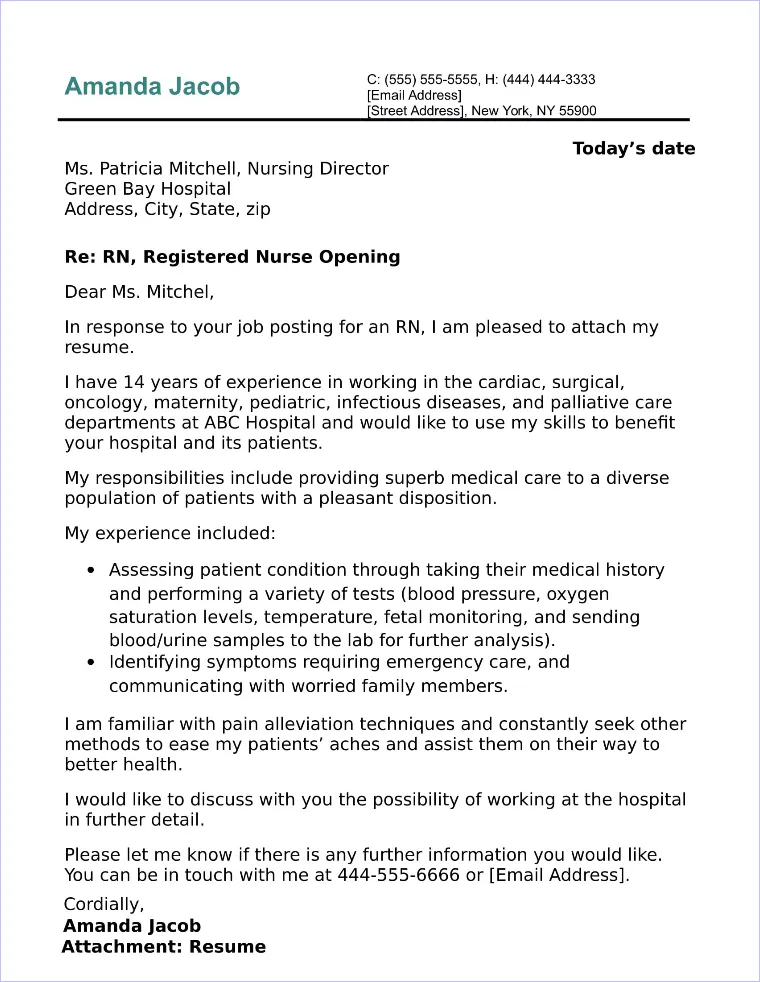
For entry-level registered nurses, the cover letter should focus on your educational background, clinical experiences, and any relevant skills you have acquired during your nursing education. Highlight any volunteer work, internships, or clinical rotations you have completed. Emphasize your passion for nursing and your eagerness to learn and grow in the profession. Mention any awards, honors, or academic achievements that demonstrate your aptitude. Showcase any skills you gained that are specific to the job’s requirements. For example, mention proficiency in electronic health records or other specific equipment you have used. Demonstrate a strong work ethic, a commitment to patient care, and a willingness to contribute to the team. This is your chance to show how you can contribute to the healthcare facility as a novice.
Example Cover Letter for an Experienced RN
Experienced registered nurses should highlight their specialized skills, professional accomplishments, and leadership experiences in their cover letters. Mention the number of years you’ve been working as a registered nurse. Provide examples of how you have improved patient outcomes, mentored new nurses, or contributed to the efficiency of a unit. Showcase any certifications, advanced training, or professional development activities you have undertaken. Quantify your achievements whenever possible by using metrics such as reduced readmission rates, improved patient satisfaction scores, or increased staff retention. Highlight any leadership roles you have held, such as charge nurse or clinical supervisor. Demonstrate your ability to take initiative, solve problems, and lead a team. The cover letter is a great place to highlight experience and demonstrate your ability to lead.
Tips for a Successful Job Application
In addition to a compelling cover letter, there are other factors that can increase your chances of a successful job application. First, create a professional and well-formatted resume that highlights your skills and experience. Tailor your resume to match the job description, emphasizing the skills and qualifications the employer is seeking. Proofread your resume carefully and ask someone to review it for errors. Research the organization and the role thoroughly. Understand the company’s mission, values, and culture. Customize your cover letter and resume to demonstrate your understanding of the organization and the role. Prepare for the interview by practicing common interview questions and researching the interviewers. Dress professionally and arrive on time for your interview. Follow up with a thank-you note after the interview to express your appreciation and reiterate your interest in the position. Following these tips will significantly improve your chances of landing your dream job in nursing.
